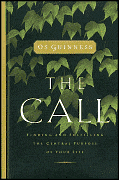
Is a quickly dashed-off list of stuff we sold at OCBP a window into the soul of today’s student leaders or mostly a picture of the books we most promoted? I had some nifty pictures of me cajoling said young evangelicals into buying certain books, and other shots of the goofy array of display options there at Wesley Avenue house (that I alluded to in my last posting.) I’ve skipped the shots and thought I’d rather report on a handful of the fun books students took. While it may be a window into their tastes, it surely illustrates the front-lines of the book work we do here at Hearts & Minds and I hope you find it interesting.
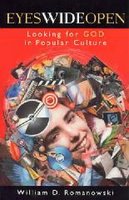
Of course pop culture stuff often is always exciting, and another old OCBP speaker, Bill Romanowski, has the standard introductory book in that field, Eyes Wide Open: Finding God in Popular Culture. We took a stack of those, natch. Just to be ornery, we placedbeside that stack a few of the new anniversary edition of Amusing Ourselves to Death (the new forward by Neil Postman’s son is a treat; Dr. Postman’s introduction is nearly worth the price of the book itself, and I was going to cite it in my lectures.) In the classes I taught, we talked a bit about learning the skills to use spiritual eyes to discern the underlying messages presumed in textbooks, articles, art and cultural artifacts and used as an easy example the way advertising pushes certain ways of seeing the world. Creepy values of the American Dream subvert us and what we hear in Sunday sermons, and I showed a few samples. Sam Van Eman’s book, On Earth as it is in Advertising: Moving from Commercial Hype to Gospel Hope is a must-have resource for those thinking about such cultural discernment. There were a few communications and PR majors, so Q. Schultze’s fabulous Communicating for Life: Christian Stewardship in Media and Community is the essential standard for a Christian perspective in mass media. I showed a few guys his deeply thoughtful and (I think) very important book on the spirituality of information technology—Habits of the High Tech Heart which offers ways to nurture virtues that can sustain a humane and human use of computers and other modern technologies. One smart guy bought, one, I think. Today’s young adults, of course, grew up on this stuff and, to my concern, they seem not too concerned about the downsides or ethical imperatives of the forms and structures of this stuff.
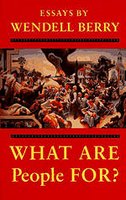
Wendell Berry’s “Why I Don’t Use a Computer” from What Are People For? raised some eyebrows, but I was glad that a few folks bought a collection or two of his essays, a couple volumes of his poetry. We take his stuff everywhere we go, and have for years!
Art majors saw Calvin Seerveld’s wise books, and I think we sold one of Art and Soul (perhaps the best book to start with for thoughtful artists wanting a faithful interaction), written by Jubilee speaker Adrienne Chaplin, Dr. Seerveld’s replacement at Toronto’s Institute for Christian Studies. The very brief, very nice, brand newArt for God’s Sake (Philip Ryken, pastor at 10th Presbyterian in Philly) was an inexpensive starter for a few. Two musical theater majors were happy to see books on music (A Song to Sing, A Life To Life: Reflections on Music as Spiritual Practice by Don and Emily Saliers—he, a high-church liturgist and theologian of worship and she a rock star from the Indigo Girls—is a personal favorite.) A few of the U2 books sold, too—-I hope folks are tiring of the helpful Christian studies of these guys; some students still seemed surprised to see this kind of matieral since many “Christian” bookstores don’t stock things like Religious Nuts and Political Fanatics: U2 in Theological Perspective. One fun seller this year was You’ve Got to Have a Dream by Ian Bradley— a great new book which explores religious themes in the history of popular Broadway shows from old Gilbert & O’Sullivan through the 70’s era, to Cats, Miss Saigon, and Les Mis… (The title, of course, is from a song in South Pacific; thanks for singing, Liz!) What a delight that theatrically-gifted students can explore these themes together with a book like this! .
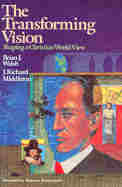
Of course we did our share of pushing worldview stuff: Walsh & Middleton’s The Transforming Vision remains one of our all time favs and traces the history of the rise of dualism as simply as any book we know, making it essential for anyone wanting to delve seriously into the call of “academic discipleship” and the reformation of scholarship. Nancy Pearcy’s Total Truth is a biggee in this field, too, and the new study guide in the back helps. Al Wolter’s Creation Regained was cited occasionally and I think a few students will benefit from his “structure and direction” chapter, especially. The new chapter–linking Newbigin’s missiology and N.T. Wright’s narrative view of Scripture–makes getting the new edition well worth it. I usually take all sorts of cultural criticism, and stuff like Peter Berger, Lakhoff’s Metaphors We Live By, Bruggemann’s The Prophetic Imagination, some emergent stuff, and a number of oddball books—Supper of the Lamb or Fast-Food Nation or Technopoly and Albert Hsu’s new Suburban Christian for those wanting something just a bit different that relates faith and our contemporary cultural forms.
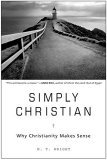
Speaking of N.T. Wright, his book on Paul and his book on the authority of the Bible, tellingly, rose no eyebrows. And I didn’t sell any, either. But his new Simply Christian: Why Christianity Makes Sense was very interesting to a few students who had thoughtful friends who needed a clear overview of the faith, written for seekers and yearners, but who find, for reasons that may be obvious, Mere Christianity a bit too heady or dry. Wright wrote Simply Christian to show how the grand Biblical drama—with his helpful take on the flow of the narrative and hope for new creation—could be the worldviewish framework to make sense of our post-9-11 desire for the world to be made just, and of our post-modern confusion about gender to be made right. We all have these longings–a theme of Lewis, you recall–and Wright shows that Biblical faith is the relevant Story to make sense of these desires. It is a grand book and if it were not still in hardcover, I could have sold even more for these folks to give to their interested friends.
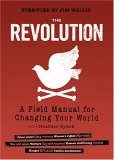
Rich Christians in an Age of Hunger became an important resource for those wanting the Biblical basis for social concern; books on race, urban ministry, the stuff of Shane Claiborne and Relevant’s new The Revolution: A Field Manual for Changing Your World (a handbook for activism on a variety of human rights, social justice and peacemaking causes) sold well. Gary Haugen will be at Jubilee next year, so we pushed The Good News About Injustice. It is a book I wish we could sell everywhere we go!
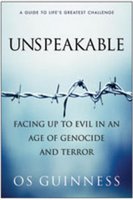
The Call by Os Guinness is one I take nearly everywhere I go and I was happy to see their interest in his work. I hope you don’t tire of me saying so. We sold a couple of Unspeakable on the problem of evil—my, my, what an important resource as we attempt to be faithful in our times—and I tried to introduce this younger generation to his esteemed work. I think somebody even bought Long Journey Home and I was glad that she would give this balanced and thoughtful overview of the quest for meaning and truth to some sharp seeker.
A handful of titles sold on integrating faith and learning, stuff on college as such, and navigating faithfully the assertion of a Christian view in the pluralistic university. This was, after all, the topic I was asked to address. I assume you know the work of James Sire, for instance, which is a good example of the call to the Christian mind. (I sold a few of the handsome little book I blogged about last week, The Mind of God by James White.) Happily, I spoke with nearly every student about their major, and attempted to find books that related—-we sold at least two books on mathematics, one on science, a few on business, one on special education, another on teaching faithfully in a public school. Students desire to bring their faith into the classroom as they think critically about how God might want them to consider and frame the ideas about their majors. To sell a Christian book on the philosophy of technology, say, or a Biblically-informed view of nursing, or athletics or political science just makes my day. Please pray with us that the slow work of reading and embracing these books would bear much fruit in the years to come!
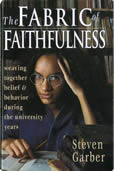
Of course a couple of books on post-modernism sold—we were happy to show Messiah College professor and Hearts & Minds friend, Crystal Downing’s new book, How Postmodernism Served My Faith and Jamie Smith’s great little set of lectures given at L’Abri, Whose Afraid of Postmodernism?. (Stay tuned in a day or so for some comments on that major new work!) On the topic of Christian learning and faith development as a college student, we obviously promoted Steve Garber’s Fabric of Faithfulness. I mentioned that in my last post, since Steve was the speaker following us at the Project. Pray for him today, since he’s holding forth there now. I hope these fun and feisty students are able to deeply resonate with his caring and important teaching. He is, as you know, a dear friend, and I think his book to be one of the most important I’ve ever read.
And, of course, of course—my little claim to fame on the back of a book: my blurb is on the back along with Marva Dawn, Walt Brueggemann, N.T. Wright and other big-wigs—Colossians ReMixed: Subverting the Empire the best Bible study book I’ve read in ages, a last year’s best book that I am still unbelievably taken with. What a provocative and serious study of culture, politics, philosophy, apologetics, environmental studies, all mixed in by way of a radical and creative exegesis of the New Testament powerhouse of an epistle, Colossians. Way to go Walsh & Keesmaat! Not as many students bought this, my recommendation or not, as I would have wished. Maybe later.
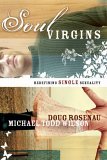
Lastly, as if this isn’t heady stuff isn’t enough to illustrate the kinds of favs we promote at these workshops with the best CCO students we can find: books on personal growth, relationships, sexuality, gender roles and such always have great appeal. Although some of the students come from denominations that do not ordain women, we promoted evangelical feminist work like Elaine Storkey (The Origins of Difference) or Mary Stewart Van Leeuwen’s Gender and Grace, still a book that we think to be absolutely essential. I don’t always agree Frederica Mathewes-Green’s traditionalist perpsective, but one can hardly find a better written and more interesting collection than Gender by the thoughtful Orthodox writer who is always fascinating and enriching. I wish more students followed her stuff. The new book Soul Virgins by Doug Rosenau and Michael Todd Wilson is a good study of the details of young adult sexuality; of course Lauren Winner’s Real Sex: The Naked Truth About Chastity, now in paperback, was the best seller of the week. (And, thankfully, since it is by far the best book on the subject! Her other two books were OCBP big sellers, too! Hoo-ray!)
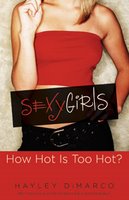
Although light-hearted with fun (retro) pictures, Sexy Girls: How Hot is Too Hot? by Hayley DiMarco caught some attention, too. So did the similiarly colorful Technical Virgins, that at least one young lady found very surprising (guy’s get turned on by stuff like backrubs? Geesh.) Another H&M fav, reviewed at our website a year ago, Wanting to Be Like Her: Body Image Secrets Victoria Won’t Tell You by Michelle Graham was snapped up. I wish I could have taken more as it really is one of the most helpful books for young women that we know about. More academic, and the best semi-scholarly book on the subject is Lillian Calles Barger’s Eve’s Revenge. Stuff on eating disorders, date rape, and other sad topics are usually picked up, too, and so much comes down to this intimate and hard aspect of young adulthood: emerging faithful and whole as an embodied and gendered person who knows she or he is made in God’s image.
Which, by the way, is the theme of the other largest seller of the week: Brennan Manning’s Abba’s Child: The Cry of the Heart for Intimate Belonging. Alongside standard books on spiritual formation, prayerfulness, centering—one gal there knew Richard Foster personally–and such, Manning speaks the language of today’s youth, insisting we can be authentic and real in community when we are convinced our abba calls us beloved. Thanks to Shelby, especially, for reminding students of this foundational truth and for recommending this deeply relevant title.
The last stretch of the OCBP—Tibbs & Campbell on racism, Borger on cultural transformation through academic discipleship, Garber on “reading the Word and reading the world”—are surely based on the earlier weeks; an overview of the Biblical narrative, a solid treatment of the doctrines of grace, Shelby teaching about God’s love for us as it enables us to be responsible leaders. Each author mentioned books, and our book display showed off more. Thanks to each and every participant in the OCBP—the planners, those who donate, the staff and of course the great gang of students. We count it a privelege to be a part of it all. And we’re glad you liked our books.
Monthly Archives: July 2006
Random good books from OCBP: A window into…
 Here’s this year’s OCBP crew and a link to the
Here’s this year’s OCBP crew and a link to the
brief reflection from one of the early students to participate in this sumer project in the late 80’s here.
Velvet Elvis, Henri Nouwen, The Drama of Scripture and Harvie Conn
I’ve often mentioned the Pittsburgh-based Coalition for Christian Outreach (CCO) and my work helping to resource them with books and stuff; I even get to help with their training, pontificating about the Lordship of Christ, how faith must lead to cultural engagement, and how the likes of Dutch statesman Abraham Kuyper and his theological and philosophical heirs can provide good substance for ongoing social change for God’s glory. Their staff come from a variety of places and, although solidly evangelical, are delightfully diverse. CCO links them with local churches throughout the mid-Atlantic who care about the colleges that are nearby. It is great to see their staff read deeply, knowing that these books will shape the tone and content of their ministry with tomorrow’s leaders on their respective campuses.
One of the more interesting places we get to do CCO work is at their summer-long Ocean City Beach Project (OCBP) which draws a few dozen of the best CCO students and just a few of their staff who run the place. A lovely old Victorian hotel-type building in Ocean City NJ is the site for this intensive bit of community living, in-class sessions and face-to-face discipleship. They let The Borger’s keep coming back in part due to my flamboyant passion for all things reformational—the call to integrate faith and learning, the dream of socially-relevant Godly campus renewal, the hope of seeing students develop vocational holiness in their respective careers, the Biblical insistence on social justice and responsible peacemaking, the stories of books that change peoples lives, etc. They also like it that we lug about a half a ton of Hearts & Minds books up those old beach-house stairs, and set them up, creating a temporary bookstore right in their living room. (No air hockey playing while the books are here and don’t even think about the pool tables; we claim every horizontal space to display our bookish wares.)
CCO leaders pick books for the students to officially read (other than the ones we hawk there on site.) This year, they assigned the fun, wholistic, po-mo piece Velvet Elvis by Rob “Nooma” Bell, our favorite overview of the Bible, The Drama of Scripture by Craig Bartholomew & Michael Goheen, In the Name of Jesus, an excellent, gentle book on leadership by contemplative priest, Henri Nouwen, and Evangelism: Doing Justice and Preaching Grace, an oldie but goodie from the late Westminster Seminary urban ministry whiz, Harvie Conn.
Interestingly, each one of these four books offers a vision of life in this world that is deeply Christian, Biblical faithful, and very culturally engaged and gets at that (at least in part) by rejecting the non-Biblical worldview that presumes a sacred-secular dichotomy. Pagan Greek dualism is not Biblical, these books insist, and a robust Christian contribution to culture will develop to the extent that we reject the truncated gospel that inevitably grows from the soil of such dualistic disdain for the worlds of work, politics, art, the enviroment, or sexuality. An earthy spirituality—ahh, read that last chapter of Rob Bell!—is what the CCO wants to pass on to these young leaders. Living near the awesome beauty of the ocean, amidst the vanity fair of the increasingly vulgar boardwalk, in community with other brothers and sisters, for better or for worse, and attending class and helping out at the local church, is a great way to help nurture in these students a sense of their calling to serve God in all they do, even their day to day work and studies.
Maybe tomorrow, if I find time, I might list a few of the best-sellers at OCBP 06. It is interesting to see what these new, young friends were buying. For now, say a prayer for their next week (with good friend Steve Garber, whose Fabric of Faithfulness is a must-read for serious-minded collegiates or those who care about “weaving together belief and behavior” over the long-haul of life.) And pray for Hearts & Minds as we get settled back into the Dallastown work. Thanks.
Bruce Cockburn & Bill Mallonee
Two brand new albums will be available for sale on Tuesday, recordings by artists who I have been prone to suggest “got me through the 80’s and got me through the 90’s, respectively.” That would be Bruce Cockburn and Bill Mallonee.* Both have brand new CD’s and we are offering a special deal: buy ’em both for twenty-two bucks.
Two for $22. At least for now.
Bruce Cockburn’s new album is called Life Short-Call Now. The new Bill Mallonee, with his band called Victory Garden, is called Permafrost.
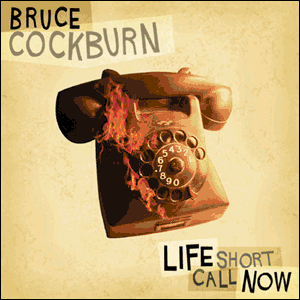
Mr. Cockburn is one of the more literate rock composers, and surely one of the top masters of the both the electric and acoustic guitar in our age. He is greatly esteemed by other artists, rock critics, and his fans are fiercely loyal. Check out his own lovely website the the ambitious Cockburn Project for updates on his work, a compilation of stuff he’s said about various songs, etc. and reports from his tours and many benefits. His lifetime of very classy work—almost always deeply rooted in Biblical wisdom, telling how he sees life and times—is extraordinary in both its magnitude and its magnifigance. Don’t even ask which album is my favorite. No can do. You will get a good look into the theological significance of his work by visiting Brian Walsh’s webpage, and clicking on a couple of the serious articles Walsh has written, about Cockburn (scroll down through the titles till you see them) or a few of the album reviews; all very insightful and will help you appreciate and enjoy Bruce’s music.

Bill M–formerly frontman of Vigilantes of Love–has been as hard-working as an touring artist can be, on the road, often by himself, playing often small gigs despite his critical success, layin’ in out there for all to see. He has an awesome website, and makes out-takes and live cuts available on line (I am a huge fan, but just can’t do the music download thing; it is too complicated. For those savvy enough, check out Billtunes. ) Mallonee is a bit more connected to the contemporary Christian music subculture–well, by a thread, in the way that Pedro the Lion might be, in that he’s done Cornerstone, Purple Door and Greenbelt.  He is gritty, Americana rootsy (think Jay Farrar and the whole alt-country thing), wails with static-filled electric nods to Neil Young and, as a critic in the Times once put it, is as good a writer as Dylan. Mallonee’s harsh sense of life, of his own screwed up life, is mediated by hard grace and goodness that pops up down there in the South like kudza or something (he’s from Georgia and came out of the hot Athens music scene) as he bangs an acoustic accompanied by accordian, before that became cool. He’s like Flannery O’Connor, I guess, at least the really poor man’s version, with harmonica. I’d like to say the poor man’s Calvinist version, but I’m not sure that makes sense…
He is gritty, Americana rootsy (think Jay Farrar and the whole alt-country thing), wails with static-filled electric nods to Neil Young and, as a critic in the Times once put it, is as good a writer as Dylan. Mallonee’s harsh sense of life, of his own screwed up life, is mediated by hard grace and goodness that pops up down there in the South like kudza or something (he’s from Georgia and came out of the hot Athens music scene) as he bangs an acoustic accompanied by accordian, before that became cool. He’s like Flannery O’Connor, I guess, at least the really poor man’s version, with harmonica. I’d like to say the poor man’s Calvinist version, but I’m not sure that makes sense…
Anway, Cockburn’s album is a bit different—still jazzy, political, mystical, some songs demanding, others gorgeous, and a few tracks have some horns. Fascinating. Bill’s is like his last few, pretty acoustic, wordy, pained, profoundly hopeful for those with ears to hear. I love ’em both, and can’t stop listening. We carry most of their backlist and even related oddball stuff (like The Depp Theory, a hip-hop jazz group that does a few Cockburn songs, that he sings on. A tribute album to Cockburn by a sweet Canadian folkster named Steve Bell will be here any day, too, and that will be lovely for older fans, especially. ) The Cockburn catalogue is all being remastered and reissued, btw, often with a new song or two.
*A few years ago, in tribute to the “in the world but not of it” engaging culture vision of Bob Briner (author of Roaring Lambs) a compilation album of preforming artists who are Christians with that sensibility was put out. Bill Mallonee was obviously on it. The number he did? Wooooieeee, yessir: He did Cockburn’s hit, “Wonderin’ Where the Lions Are?” Speaking of which, did anybody hear the Jimmy Buffett version that is in the movie Hoot? Buffett has done at least two or three other Cockburn covers, like Pacing the Cage. Nicely done, too.
Teaching and Talking Books with the CCO
The past few days had me out at Geneva College in Beaver Falls, PA, where the Coalition for Christian Outreach (CCO) was training their new staff. Beth and I worked for CCO years ago and we have remained associated with them as their official bookseller. We get to attend their good staff seminars every few months—hearing folks as wonderful as Tremper Longman and Father Thomas Hopko; Ruth Haley Barton and Ron Sider; Steve Garber and Brenda Salter McNeil; Denis Haack and Marva Dawn. These are the sorts of authors who over the years have nurtured the campus ministry staff of this creative and fun organization— we are privileged to play a role in their on-going staff training. If you are not familiar with this Pittsburgh-based para-church campus ministry, check out their website and ponder their provocative core values. How fun, too, that they’ve won the “Best Place to Work” award several years running in their size category of ministry organization. Click, if you haven’t, on the Jubilee conference blinking thing, too, (see above) which we keep at our blog, the conference which is their flagship event, the highlight of our year, the nations premier event designed to help students relate faith to the college experience.
Anyway, I drove five hours due West on the rainy Pennsylvania turnpike, getting out to the lovely Geneva campus around 11:00; Gus met me and we set up books, listening to the new Van Morrison country album, and the “apocalyptic bluegrass” album, B-Collision by the David Crowder Band. We got done around 5 am.
That morning, after an hour of sleep, I ripped into my lecture cum sermon about cultural engagement, Christ’s call to be “salt and light” as we live into the ways of the Kingdom “on Earth as it is in Heaven.” “Transforming College Students To Transform the World” is a key slogan of the CCO and that is all I needed to ramp up the passion for three solid hours. That these young CCO staff will be impacting tomorrow’s leaders is strategic and exciting and we pray that in God’s mercy, good, important things happen for Christ’s glory in the arena of American colleges. (Do you know God on the Quad a study of recent religious interest on campuses, written by a fabulous and sharp Jewish journalist, Naomi Riley? Thanks be to God. But, yet, do you know the riveting and vulgar novel, I Am Charlotte Simons by Tom Wolfe? Oh, my, what needs we have. Read this vivid article from Rolling Stone about the sexual practices of Duke students if you can stomach it, if you don’t believe me.)
I was happy to hang out with the brand new CCO staff for a couple of days, dreaming up ways to disciple the next generation of collegiates into responsible discipleship, whole-life faith, integrated, worldviewish approaches that would honor Christ, glorify God, strengthen the church and serve our needy, needy world, including the professional spheres and social institutions their students will eventually enter. Thanks to CCO for letting me do my talks, equipping this emerging cohort of new staff, and thanks for the new staff themselves for their encouragement to me, for their faith in Christ’s sovereign work and their desire to make a difference on campus. As Abraham Kuyper put it over 100 years ago in his famous Princeton Lectures On Calvinism “There isn’t one square inch of creation that Christ does not look upon and say “Mine!”” May God us them and us to raise up a generation of sons and daughters of Isachaar, who “knew the times and knew what God’s people should do.” (2 Chronicles 12:32.)
To develop competencies in campus ministry from this holistic perspective, staff purchased books on all kinds of topics–of course Walsh & Middleton’s Transforming Vision on developing a Christian worldview, and Brian Walsh’s little powerhouse follow-up, Subversive Christianity and other similar works like Wolter’s Creation Regained or Paul Marshall’s Heaven is Not My Home: Living in the Now of God’s Creation. They need stuff on sexual ethics, books on prayer and contemplative spiritual formation, Bible works, titles on evangelism, things on outdoors ministry and devotionals to use in the wilderness, books which explore theological topics, stuff on the church. You can imagine the specialty titles that they needed, too–books on eating disorders, popular culture, postmodernism, racial reconciliation, apologetics, lay counseling and leadership development among students. (Ahh, if most church pastors where this well read and keenly aware…)
Of course, they are studying how to integrate faith into the setting of higher education so they read Steve Garber’s Fabric of Faithfulness: Weaving Together Belief and Behavior and Engaging God’s World by Cornelius Plantinga. Some CCO staff work also with youth so we promoted Walt Mueller’s must-read Engaging the Soul of Youth Ministry and the new Contemplative Youth Ministry by Mark Yaconelli. (How ’bout that forward by Anne Lamott, whose son is a kid that Mark befriends.) Some CCO work in residence halls and are studying the nature of student development—the only book which offers a uniquely Christian approach to that profession is Rethinking Student Affairs Reconsidered, edited by Dave Guthrie. You just know we took these kinds of books, books that simply aren’t available at most bookstores. I will happily drive five hours and work all night to display these rare and important Kingdom resources!
And, unlike some who work on college campuses, CCO staff often buy books to give to their future students, choosing resources by major—art, science, business, psychology, technology, political science, media studies, sports and the like. (See our bibliography at the website called “Books by Vocation” for descriptions of some of these.) If they are going to invite their students to “think Christianly” and be agents of reformation in their various disciplines at college (and eventually to make a healing impact in their careers) they must have tools to use with book groups studying to bring Biblical wisdom into their various academic studies. George Marsden famously made New York Times news (ask me about it sometime) and published The Outrageous Idea of Christian Scholarship to explain this approach. At their most mature, that is what characterizes the CCO campus ministry approach, bringing broad Christian thinking not only into the personal lives of young adults, but equipping those adults to be serious learners, faithful in their vocation as students, creative and redemptive in their scholarship and preparation for a lifetime of servant leadership in the workworld.
You can imagine, perhaps, that the last several BookNotes posts—my kudos to Ron Sider & Os Guinness, that wonderful book about learning and reading (A Mind for God by White) that I reviewed, and Kelly Monroe’s excellent and important narrative about her work on campus leading the Veritas Forum (Finding God Beyond Harvard)—would be the kinds of things that these campus workers would find helpful. Scroll down and see the last few posts if you haven’t read those yet. They are now so fired up to get out to meet students, to build partnerships with churches and colleges, to raise the necessary money to do so they hardly have time to think and reflect and study. I don’t think they can afford all the books they need (they each raise their own salaries, old-school missionary style.) Please pray, for them, for others in collegiate work, and for us, that we would learn how best to serve them. (I will be teaching a week on these same themes with some of their finest undergrad students next week.) Perhaps you can help somehow, making donations, supporting campus ministry programs in your region, buying books on the Christian mind for young adults you know, and spreading the news about the books we sell that promote a responsible Christian cultural engagement. Thanks for being a part of our story….
Ron Sider & Os Guinness
You may recall, in the post before that, I noted that Beth and I were setting up a large book display at the annual event sponsored by the Jonathan Edwards Institute. Edwards was a man convinced of the glory of God, passionate about his calling to invite faithful living in response to Christ’s grace. He was a scholar, a philosopher, a college president (Princeton), somewhat of a scientist and one of church history’s most thoughtful theologians and prolific pastors. More on him in another post.
Now, though, I want to say two things: First, after waiting for a wedding to get done in the Annapolis ballroom where we were setting up—finally getting the 6 hour project underway after 11:00 PM (that was with three of us working)—we created a temporary bookstore with a great offering of books on everything from Puritan theology to contemporary cultural analysis. Workshops on topics such as the questions of war and peace, globalization, the problems with both the Christian right and the Christian left, and bio-ethics absorbed us as we worshipped well and thought hard. It was a good event and we want to thank those that purchased books from us there. A special highlight was selling books to one of the most well-read guys we know, the very astute Ken Myers, of Mars Hill Audio. He was fluent and gracious as always. We hope you subscribe to his monthly audio journal. So— thanks to those who were there, and for those who prayed for our journey.
Secondly: it was a special delight of ours to look at the special book table we had arranged with signs indicating that these were the “speaker’s books”, books authored or edited by the seminar leaders or keynote speakers, and see, side by side, stacks of books written by two particular authors. There they were, on the same table, books authored by two men who are among our all-time favorite writers, prolific authors whose many books have nourished us (and challanged us) along the way. Both have been in our store, both have done gigs for us here in the York area. And both keep putting out resources for deepened discipleship that any thoughtful lay reader can appreciate—meaty and substantive, but not arcane or overly academic. They are, as my headline indicated, two gentleman that we are truly proud to know, happy to recommend, and glad to have seen at the JEI event, together, Drs Ron Sider and Os Guinness.
And so, of course, we must do a blog special. We are pleased to offer two of the most important books of our time–that isn’t hyperbole!—in a special package deal.
We are offering Ron’s Rich Christians in an Age of Hunger (in an updated, revised edition; early versions were named by Christianity Today as one of the top 100 books of the 20th century!) and Os’ The Call: Finding and Fulfilling the Central Purpose of Your Life for just $20.00.
To buy them both at regular price would cost about $34.00 Our blog special is to sell them both for $20.00. It is our tribute to these two men and the way they have gifted us—their readers–with important ideas, gracefully written, challenging and empowering. Enjoy.
Email us (read@heartsandmindsbooks.com), call 717.246.3333 or use the website order page.
Better Late Than Never: June column on line and Free Nooma Deal

Yes, I know, it is odd to annouce that our monthly book review column for June over at the Hearts & Minds website is now up. I won’t make excuses, although there are some interesting ones.
Please check out this rather complex introduction and long letter I wrote as a preamble to this month’s bibliography on wealth, finances, thinking Christianly about economics, work, business and the marketplace. As you can see for yourself, we’ve annotated a list of titles that may not be very well known—-we may be one of the few bookstores in the world that carries this particular selection. No anybody that would find this useful? Pass it on!
How’s that for a way to compensate for doing the June column in early July? How’s that for a great deal—buy one of our recommended books on economics, business, wealth or a Christian view of work and get Nooma 013, Rich, for free. This deal can’t go on forever, so we will end it when the next monthly column goes on line, later in July.
Order over at the website or send us an email (read@heartsandmindsbooks.com) or call us (717.246.3333) noting this blog free DVD special.
*I’ve never done the small print thing, and sort of hate to, but this offer really can’t include the out-of-print Denis Haack book, The Rest of Success, which is being sold at an unreasonably cheap price anyway.
Our Favorite Recent Novels
We love nonfiction books and it seems the more we learn, the more God’s good creation calls to us—-learn this! Study that! Enjoy it all! From the obvious importance of theology and the discerning study of worldviews to science, history, nature writing, economics, biography, world cultures, gender studies, art history, urban planning…more than ever, the old adage "too many books too little time" rings true. We are so grateful that our supportive customers appreciate the effort of Hearts & Minds to be a well-stocked, multi-dimensional bookstore, and regularly encourage us by sharing our passion for books of all sorts. We may be a dying breed, you know.
One irony of our passion for breadth in non-fiction reading is that it makes us all the more appreciate fiction. I do not mean what you might think at first—that trudging through dry nonfiction tomes works up a thirst for the fun and frivolous; not at all. The best nonfiction books are well-written and interesting After all, Christian doctrine is way too important to be written by the boring; the detailed quandaries of modern psychics should be written as glorious doxology, I’d say. And how’s this for a back-cover blurb, from the ingeniously titled The Dead Beat: Lost Souls, Lucky Stiffs, and the Perverse Pleasures of Obituaries (HarperCollins; $24.95)"Marilyn Johnson pulls it off with death-defying grace, insight, charm and wit. " Or this: "Vital reading for anyone who knows a dead person or is likely to become one." Roy Blount, Jr. says "If Marilyn Johnson had been meaner, I could have said she puts the "bitch" in obituary. Instead, she’s written a warm, funny, appreciative book that, ironically enough should live forever. But get it now." Who says nonfiction isn’t great reading!
No, what I mean by this assertion that wide nonfiction reading might drive us to a deeper appreciation of novels is that the more one reads about, the more one wants to experience, to really know. And that, even if vicarious, is a fruit of good fiction. In a good novel, you can be there. I know for many who read literary criticism–at least the good kind–this is nearly a cliché, so I beg your pardon. For some of us, this is, shall we say, a novel insight.
A wondrous new novel by the popular and well-respected Julia Alvarez illustrates this well. In Saving the World (Alconquin; $24.95) she weaves together two mesmerizing stories, each page-turners in their own way. Every other chapter tells of a contemporary Latina author, stumped on her next overdue novel, while her husband leads an ecologically-minded development project amongst the poor of her homeland, the Dominican Republic. In a single page you can get to know a bit about the professional concerns of a contemporary novelist, the lonely feelings of a middle-age woman whose beloved is out of country, and the visionary politics of a humanitarian relief worker doing good science for the poor of our hemisphere.
Intermittent chapters tell of an historical episode that our writer is studying (one of the reasons she can’t finish her own work. She is so taken with this little known historical drama.) In those riveting chapters, a story unfolds about a 16th century nun and her charge of young orphans who are making a risky journey to the New World. These orphans have been infected purposefully with small pox so a young scientist, with blessings from Pope and King, can carry a new invention—a vaccination!—and its healing powers to infected, dying natives of the Americas. What a grand plan! The boys, it is said, will only be mildly ill, and this is the only way to keep the pox vaccine alive.
In both these stories within Saving the World, strong women stand by a visionary man, each set on doing great good in the fallen world. These short chapters have kept me up late—just one more!–and have not only provided much food for thought (how could it not?) but have helped me understand history, the complexities of nature and the glories and foibles of human nature. When our local newspaper called recently, asking our recommendations for meaningful beach books, this was the first we described. Thrilling, and a page-turner, it stands out, drawing us in to these lives.
(Interestingly, the "spiritually-themed" interests of this particular feature of this reporter had her happily searching non-Borders books; she called our local typical, "Christian bookstore" who admirably, if predictably, suggested Jan Karon. She then called a local new age shop who recommended a cheesy self-help book by Wayne Dwyer—eeck—and some Wiccan fable. One might have thought they’d have pushed the cool story The Way of the Peaceful Warrior which is coming out as a summer movie in August. But I digress, as book-lovers often do…)
The next book we seriously recommended (or was it the first?) may be my favorite novel of the year—certainly in the top few. All of our staff were waiting for Marsena Konkle’s first novel, A Dark Oval Stone, released this Spring by Paraclete Press ($23.95.) It has a stunningly simple and exquisite cover over a solid and perfectly sized hardback. Ms. Konkle—long-time friend of Hearts & Minds through our partnership with Ransom Fellowship and their Critique journal that she used to edit—is a young woman we’ve admired and respected. And she is a very good wordsmith. She submitted her manuscript two years ago to a publishing contest at the prestigious Calvin College Festival of Faith and Writing; Lief Enger (of the extraordinary Peace Like a River) was the main judge. Paraclete Press, known mostly for spirituality, liturgical books, and the occasional, brilliant memoir (like Lauren Winner’s Mudhouse Sabbath) promised to publish the winning one. (Dare I now say that the Paraclete Press Fiction Award is coveted?) They have done good novels before—-a monastic mystery series (yes, you read that right) and the well-reviewed novel of the spiritual journey of an art historian doing restoration work, Unveiling by Suzanne Wolfe, and the wonderful Life With Strings Attached, a 1970’s growing up story set in Alabama by Minnie Lamberth. We stock all of their novels, monastic and otherwise, and, well, all of their nonfiction, too. Kudos to them for discovering fresh, important writers and investing in serious, faith-filled fiction…
A Dark Oval Stone is a hip, contemporary story of loss and healing, friendship and what one sees in life. Miriam Kovatch is thirty-something, pregnant and suddenly widowed. With prose that just glides along effortlessly—an all too rare quality for serious literature–Konkle draws us into dialogues and memory, chatty conversation and realistic concerns, familial and otherwise. As we come to know the ups and downs of the unraveling and slowly recovering life of Miriam, we are able to experience her life–and hence, see anew our own, as good art allows. We can join her in relationships of various sorts, understand her plight, pain, doubt, frustrations, passions, and hope. My description all sounds quite cliched, I’m sure, but trust us: this is excellently crafted prose, telling a fully believable story with exceptional, mature insight. We surely "get something out of it" but it is not at a parable, moralistic. It is too real for that. It is solidly rooted in a sure-footed Christian world and life view—which sounds so antiseptic, I’m afraid, except that Dark Oval Stone is thrilling fiction, from it’s early, vivid (if brief) sex scene, to its hilarious and poignant episode of getting propositioned for a date at a grief recovery support group, to the redemptive sub-plot of Svetlana, an immigrant house-cleaner at a get-away motel Miriam holes up in for a while, to the ways Miriam’s devout Catholic mother prays for her. Konkle, herself a Protestant, has written a fascinating, brief essay on why and how she came to discover that her character was a Catholic. (Order Dark… from us and we will include that illuminating piece for your enjoyment.) It too, is very well written. Marsena is well read, thoughtful and very talented. We hope this novel is only her first and if we ever hear of more work of hers, fiction or nonfiction, we will buy it the day it is released. We heartily recommend this fun and wise story to you.
Such stories can be vastly entertaining, even as they are informative. (I have more than a few single, young, widowed friends and this story helps present a window into the textures of their lives. The quick chapter on the blur of the funeral took my breath away, and that was early on in the plot…other scenes made me exclaim how right she records the details and feel of her settings and characters– a water park, a tired old motel, a dinner party, a friendship with a youthful nephew.) Stories, can, as we’ve all heard, help us "grow wiser and more whole" as Vinita Hampton Wright (no shabby writer herself!) has generously said of Dark Oval Stone. It is not a dark or terribly complicated story—which perhaps is why it was so compelling, unlike more "sophisticated" works that may be executed with extraordinary literary zeal but don’t seem plausible. Who can relate to some of the stuff that populates faddish fiction these days?** Konkle has given us a good story that helps illuminate real relationships. Is it therefore chic-lit? I don’t think so, although I am not sad to say I cried at the end. This truly deserves the significant runner up award from Paraclete Press and we celebrate with Marsena, her family, and her publisher for this fabulous debut.
**I’m a sucker for some good-hearted off beat stuff, too, and have been a fan of books like Walter Kirn’s Thumb-Sucker and Up In the Air and thoroughly enjoyed—loved, really–the last collection of the very creative Dave Eggers short stories, How We Are Hungry. I couldn’t put down his You Shall Know Our Velocity which was pretty weird, too. And I have before exclaimed the stories of Dave Almond, graphic as some of his are. Be warned. Just so you don’t think I’m too much of a sentimentalist.
The First Prize of the Paraclete Press Fiction Award from the highly regarded Calvin Festival went to a truly spectacular and intensely written story of an Ohio farmwoman, This Heavy Silence by Nicole Mazzarella ($24.95.) Arranged in two parts—set in 1962 and 1972—this epic story is complex, interesting, rich. The plot revolves around a single farmwoman who intends to will her farm to Mattie, a child of a friend (who took her own life when Mattie was a young.) As Dottie Connell raises Mattie it becomes tragically clear that Mattie does not want the farm. (I get choked up writing this sentence—even though I read this two months ago; this is the power of such a well-told story.) I won’t tell you more of the plot, although one could list the themes that come to the surface—-seeking a sense of place, history, upward mobility, the nature of calling and desire, selfishness, even well-intended selfishness, familiar loyalty and forgiveness. My-o-my. This is fertile soil.
I should be said, too, that part of the joy of this extraordinary work is the agricultural detail. Anyone who has lived in a farm community will know that this books gets it right; it just seeps authenticity and it was a nearly sensual joy to experience the true rendering of close details. Those who enjoy Wendell Berry, the small town writings of someone like Barbara Hollander, or who may wonder what barns and fieldwork and country cooking is like will find this to be a fine introduction. Anyone interested in the changes in recent rural life (I can’t not think of Jayber Crow) will love this. Those attracted to the nature of the networks, biases, pleasantries and foibles of rural women will have a time! Get some strong coffee—not Starbucks this time, please—and some rhubarb pie, and get reading. This deftly told and tightly conceived drama was one Beth and I talked about for weeks. She has relatives on farms like this, but I do not (although both of our mothers were raised on pre-WW II farms.). We both loved this book. Ms. Mazzarella, a creative writing prof at Wheaton, knows her central Ohio stuff, and must have some agrarian blood in her veins, as it surely flows from her good pen. Kudos all around.
* * *
I suppose I would rather have you spend your discretionary time reading novels than reading me, so I will be brief. We want to give a quick blurb to a few other novels our family and staff have enjoyed this past half a year. Perhaps it will inspire you to run to your local library, or send us an e-mail order. Or maybe make your own such list.
Gilead Marilynne Robinson (Picador) $14.00 Few serious readers haven’t heard that last year’s Pulitzer Prize winner, about an aging pastor, is now out in paperback. The Washington Post Book World said of it "So serenely beautiful, and written in prose so gravely measured and thoughtful, that one feels touched with grace just to read it…A triumph of tone and imagination and a spiritual journey no reader will want to miss." Amen. I can’t believe I have not yet read Housekeeping. I have read Marilynne Robinson’s introduction to a new, brief collection of pieces by John Calvin. How cool is that?
Catherine Wheels Leif Peterson (Waterbrook) $13.99 Released to some commotion in the in-house CBA world—there is drinking and a little cussin’ and a couple sleeping together. (Imagine!) We have been happy to promote this first novel (yes, by the son of Eugene) which won us all over very quickly. A tremendously inventive story rendered in very good tones about a guy living in the Colorado castle of his college buddy, drinking himself silly while waiting to die. A child enters the picture who may or may not have mystical insights as she takes spiritual walks through the grounds of a near-by monastery. If this ain’t Christian fiction, I don’t know what is. Beautiful, thoughtful, fun, full of hope within the messiness of regret.
The Memory Keepers Daughter Kim Edwards (Penguin) $14.00 Beth just finished this and was blown away. Deeply moving on many levels– it is lovingly set in our old stomping grounds in Pittsburgh—this runaway best seller is finally about the questions of the meaning of life. That is, who should live and die, and what constitutes a life well lived? A young doctor is delivering his own baby (while is wife is anesthetized) only to find unexpected twins. One has Down’s Syndrome, which he cannot bear, and asks his nurse to take the baby (unbeknownst to his wife) to a local institution. She cannot bear that, and raises the child as her own. One reviewed called this beautifully written book "heart-breaking and heart-healing."
Almost Friends Philip Gulley (Harper) $18.95. When Multnomah published his sweet essays, I presumed he was a lightweight "Chicken Soup for the Soul" inspirational writer. How wrong I was. He is a profound Quaker theologian (controversial for his universalism) and a fine, fine wordsmith. His Harmony novels are all worth reading, perhaps a bit like Mitford. Publishers Weekly says it seriously: "Gulley’s work is comparable to Gail Godwin’s fiction, Garrison Keillor’s storytelling, and Christopher Guest’s filmmaking… " I don’t know what that last comparison means, but it makes me want to re-watch Best in Show or Waiting for Guffman.
Invisible: An Ivy Malone Mystery Lorena McCourtney (Revell) $12.99 Okay, I admit I don’t think I’ve ever read a mystery, at least not in 40 years. Several of our staff love this light-hearted story of an older woman who realizes she is inconspicuous–invisibility is the academic phrase some sociologists use for the plight of older women. This gal plays her situation to her advantage in a fun plot of solving real crimes and sleuthing away for God and justice. We’ve noticed that serious nonfiction writer Lauren Winner, who does read more mysteries than most, has given a great blurb on McCourtney’s third in this series. Amy and Patty beat her to it!
We could go on. I’ve finally read Patchwork Planet which Beth read years ago; everybody should read Anne Tyler. I have been pushing Taft by Ann Patchett ("As resonant as a blues song…Expect miracles…" says The New York Times review.) Beth has been embroiled in long Scottish novels by evangelical author and humorist Lizz Curtis Higgs which parallel a sprawling story from Genesis (we really ought to read more CBA fiction, so we’re trying. She has really liked them, although it is hard to beat the old tales of old George MacDonald, no?) She was really struck by the lyrical, haunting More Like Not Running Away, a novel by Paul Shepherd. We were first attracted to stock this in the shop because of the award it achieved, the esteemed 2004 Mary McCarthy Prize which that year was selected by erstwhile Calvinist and award-winning writer, Larry Woiwode. It was very good, Beth thought, despite the seriously raw language of the characters. Our very literary carpenter, Paul Tucker, recently brought by an old collection of Tobias Wolff short stories, The Night In Questions which he commends. The Kite Runner was just announced as Central Pennsylvania’s "One Community One Book, " which we have been excited about (we were privy prior to announcement which is such, such fun.) Next on my list (I think, I think) will be Once Upon a Day by Lisa Tucker (I adored her creative story of the working class gal with a penchant of counseling people based on the songs they like, The Song Reader.) This new one has a fabulous starred review from Publisher’s Weekly and a blurb on the back that says "Tucker gives me what I want most from fiction: compassion and provocation. Once Upon a Day is her most impressive novel to date." Well, how “Ëœbout that? My youngest daughter is reading House a scary "supernatural thriller" by Frank Perritti and Ted Dekker. Not Pulitzer stuff, I’m sure, but the tag line on the cover is pretty cool:"The only way out is in." Maybe next month I’ll give her A Tree Grows in Brooklyn or something like that. By late December, though, we will all be reading the next Wendell Berry fiction, another in the lovely Port Williams series, Andy Catlett: Early Travels. Until then, we hope these reviews prove helpful. Give us a call anytime, or order on line. As always, thanks for helping indie stores like ours survive, by spreading the word-of-mouth and cyber-space news of good books, fiction and nonfiction. Blessings.
Evangelicals in the Public Square
Every year over the 4th we go to the charming town of Annapolis, MD. We don’t see the charm much, the cobblestone and clapboard, the sails and the flags because we are cooped up in a nice hotel selling books to the participants at the Jonathan Edwards Institute’s annual conference. Over the years we’ve sold books to folks who come to hear the likes of John Piper, Scott Hafeman, David Wells, Sinclear Ferguson or John Anderson (of Reformation and Revival ministries.) The participants come from all over, are mostly Reformed, conservative pastors and laypeople, good thinkers, hungry for Bible teaching and cultural application; they take their motto and vision from the God-drenched worldview of the famous scientist, statesmen, educator, missionary and pastor, the renowned Jonathan Edwards. It is a very special conference and we are grateful to them that they allow us to play a role, setting up a huge display of Puritan writers, contemporary sociologists, theologians and worldview writers. They are very gracious folks who love God supremely because they understand that He offers sovereign grace supremely in Christ Jesus. And they want to be well-read, mature and balanced in their whole-hearted devotion and whole-life discipleship.
This year, in a bit of a twist, the theme is all about civic life, politics, foreign affairs, citizenship, bio-ethics and the like. The speakers are renowned–Os Guinness, Ken Myers (of the very classy Mars Hill Audio), Ron Sider (of Evangelicals for Social Action), Frank Young (formerly head of the FDA, with dual degrees in science and theology) and Keith Pavlischek, a just-war theorist and political philosopher who I dare to disagree with sometimes, even though he is smarter and braver than I (he just got back from Iraq; you may have seen a review he recently did in Books & Culture about same.)

As we prepare for this, we were pleased to get in the brand new book edited and partially written by J. Budziszewski, Evangelicals in the Public Square: Four Formative Voices on Political Thought and Action (Baker; $19.99.) This fine work surveys four responsible influences over the evangelical public mind of our generation, and then has a representative of that tradition give a further explanation and response to Bud’s chapter on that person. The four are Carl F. H. Henry, Abraham Kuyper, Francis Schaeffer and John Howard Yoder. (I would guess, by the way, that Ron and I will be the only two guys in the house at JEI who have been significantly influenced by the pacifism of Yoder.)
With a good forward by Mike Cromartie (who I suspect might attend this gig; I at least hope he’s there) and an important afterword by Jean Bethke Elshtain, this is a very serviceable volume, useful in many ways, fascinating and helpful.
None of these four scholars/views, I hope you understand, could be considered “the Christian right” (although Schaeffer was nearly co-opted by Falwell for a spell in the early 80’s) or the “Christian left” (although the Mennonite Yoder has influenced Jim Wallis at Sojourners.) The four respondents, by the way, of the four evangelical traditions, are David Weeks, William Edgar, John Bolt, and Ashley Woodiwiss. It is a nice way to do a book and we are thrilled to tell you about it. We will have some left after JEI, so order ’em over the holiday weekend and we will honor the conference discount of 10% off. Just email us or call. Thanks.
Evangelicals in the Public Square: Four Formative Voices on Political Thought and Action J. Budziszewski (Baker) $19.99
in honor of the Jonathan Edwards Institute Conference
10% off
order here or call 717.246.3333




